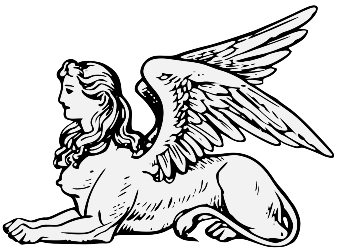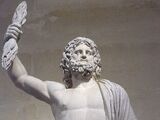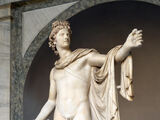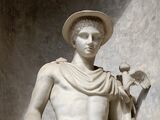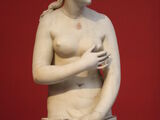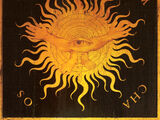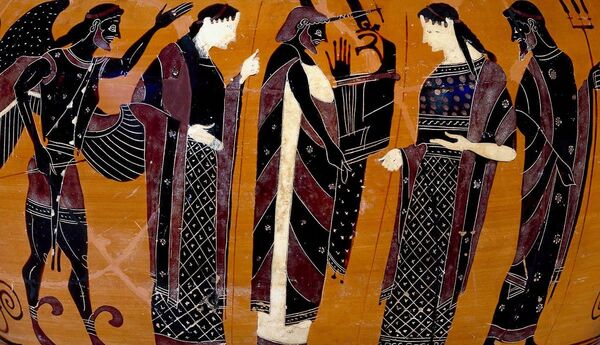
A black-figure vase depicting Apollo, Artemis, Athena and Poseidon, dated to the 6th century BCE, currently located at the British Museum
The ancient Greek deities were the myriads of gods and goddesses that were worshipped as part of ancient Greek religion. The ancient Greeks lived in a world filled with deities- both great and minor. They had deities for nearly every aspect of human existence. There were deities that represented natural phenomena, such as the earth and sky, day and night, sun and moon. Other deities represented psychological phenomena such as love and hate. Others represented abstract concepts such as war or victory.
The Primordial Gods
The Greek Primordial Gods, known as the Theoi Protogenoi, were the gods of the most basic components of creation.[1] Protogenoi literally translates to English as "first-born," and as the name implies they were the first of the gods to appear at the very beginning of existence.[1] Though they can be personified in some stories, they are typically considered to be metaphorical- representative of the non-personified elements of nature.[1] Within the Greek and wider Hellenist traditions there are competing stories on the creation of the cosmos, and the order to which the Protogenoi appeared. Because of this there differing lists as to which gods are considered Protogenoi.
The Titan Gods
The Titan Gods, known as the Theoi Titanes, were the gods produced by the coupling of the primordial deities, Heaven (Ouranos) and Earth (Gaea).[2] The first children of Heaven and Earth were the Hekatonkheires, monstrous storm giants with a hundred hands each, as well as the Kyklopes (Cyclopses), who were monstrous one-eyed giants of thunder and lightening.[2] After the Hekatonkheires and Kyklopes, the Titans, golden gods of light, were born.[2]
Ouranos was horrified by the monstrous forms of the Hekatonkheires and Kyklopes, and imprisoned them deep within Gaea, who was pained by this.[2] She urged the Titans to rebel against Ouranos, and lead by the Titan Kronos, Ouranos was castrated and banished.[2] Kronos would free the Hekatonkheires and Kyklopes, only to re-imprison them within the great pit of Tartaros.[2] Afterwards the Titans ruled over creation during a mythic golden age that lasted until they were overthrown by the Twelve Olympians.[2][3]
The Twelve Olympian Gods
The Twelve Olympians, known as the Theoi Olympioi, were the primary deities of the Greek religion and the focus of worship in ancient Greece.[4] They are comprised of the children of Kronos and Rhea that went on to rule on Mount Olympos (Hestia, Demeter, Hera, Poseidon, and Zeus), as well as the greatest of Zeus' many children (Apollon, Ares, Artemis, Athena, and Hermes), as well as Hephaistos, the son of Hera, and Aphrodite, who emerged from the sea (Thalassa) after Ouranos' phallus was thrown into it after his castration.[4] In later writings Dionysos, the son of Zeus, is listed an Olympian in replacement of Hestia.[4] Though Hades is a child of Kronos and Rhea, he is not considered one of the Olympians due to him being a chthonic deity residing in the realm of Hades.
Fearing a potential threat to his power, Kronos cannibalized his own children by swallowing them whole.[2] His consort Rhea, a Titan goddess of fertility and motherhood, was distraught by this. When her youngest child, Zeus, was born, she replaced him with a stone wrapped in a swaddling cloth and fed the stone to Kronos.[2] Zeus was hidden from Kronos until he was old enough to face him. When the time came, Zeus was assisted by the Titan goddess Metis, who fed Kronos an elixir that caused him to regurgitate his children, who were now adults, whole.[3] Zeus and his siblings fought a great war with the Titans called the Titanomachy.[5] After freeing the Hekatonkheires and Kyklopes from Tartaros, Zeus and his siblings were victorious.[5] The Titans who fought the Olympians were then thrown into Tartaros, with the Hekatonkheires serving as their guards.[2] From that point on, the Olympians ruled over creation with Zeus reigning over all as the King of the Gods.[5]
Continue Your Exploration!
To discover more about Greek deities, scroll further to browse more Greek deities categories and articles!
References
- ↑ 1.0 1.1 1.2 https://www.theoi.com/greek-mythology/primeval-gods.html
- ↑ 2.0 2.1 2.2 2.3 2.4 2.5 2.6 2.7 2.8 2.9 https://www.theoi.com/Titan/Titanes.html
- ↑ 3.0 3.1 https://www.theoi.com/Titan/TitanKronos.html#Cannibal
- ↑ 4.0 4.1 4.2 https://www.worldhistory.org/collection/58/the-12-olympian-gods/
- ↑ 5.0 5.1 5.2 https://www.worldhistory.org/zeus/
External Links
All items (63)
